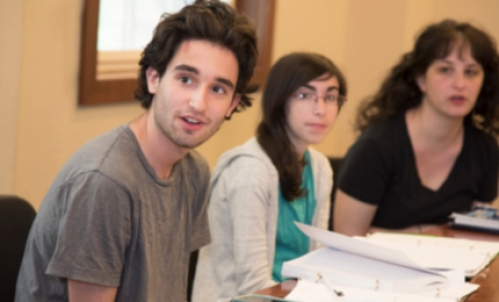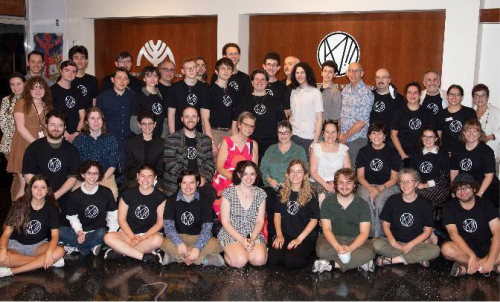2023 In-Person Course Listings
Language Classes
Language classes meet Monday through Friday, 9:50am-11:10am (ET) / 11:40am-1:00pm (ET).
BEGINNER YIDDISH GRAMMAR (In-person)
Perl Teitelbaum
This course is designed for beginners who already know the Alef-Beys, and will integrate listening, reading, speaking and writing. All language and grammar will be taught in context. Attention will also be paid to phonetic rules, along with word and sentence stress, to aid comprehension and pronunciation.
MATERIALS FOR THE COURSE:
— Yiddish: An Introduction to the Language, Literature and Culture, Vol. 1 by Sheva Zucker
— Audio recordings which accompany volume 1 of the above textbook
— Answer key to volume 1 of the above textbook
— Additional materials will be available to students for download on Canvas.
COURSE REQUIREMENTS:
In class, students will listen, speak and read as a class as well as work in pairs and small groups. We will work with the above-mentioned textbook, song texts and teacher-designed materials.
Homework will include a combination of studying, doing grammar exercises, reading texts and writing in preparation to communicate in Yiddish. Assignments will be collected in class.
BEGINNER YIDDISH LITERATURE (In-person)
Nachum Lerner
In this course, students will build vocabulary and develop their reading, writing and comprehension skills. They will be introduced to modern Yiddish culture and literature by reading and discussing texts from various genres: passages from school textbooks, songs, poetry and short stories. Videos and recordings will supplement the class discussions.
MATERIALS FOR THE COURSE:
Course packet compiled by the instructor and additional class handouts. Students will have digital access to the course materials.
COURSE REQUIREMENTS:
Class attendance, preparation and participation. Students must be prepared for class, complete all homework assignments on time and make up missed work when absent.
INTERMEDIATE I YIDDISH GRAMMAR (In-person)
Perl Teitelbaum
This language and grammar course will aim to develop students’ comprehension of written and spoken language and enable them to speak and write with greater communicative competence, fluency and grammatical accuracy beyond the elementary level. Students will be introduced to new vocabulary and grammatical structures by participating in listening, reading, speaking and writing activities on a variety of topics. Attention will also be paid to phonetic rules, along with word and sentence stress to aid comprehension and pronunciation.
MATERIALS FOR THE COURSE:
— Yiddish: An Introduction to the Language, Literature and Culture, Vol. 2 by Sheva Zucker
— Audio recordings which accompany volume 2 of the above textbook
— Answer key to the above textbook
— Additional materials will be available to students for download on Canvas.
COURSE REQUIREMENTS:
In class, students will listen, speak and read as a class as well as work in pairs and small groups. We will work with the above-mentioned textbook, song texts and teacher designed materials.
Homework will include a combination of studying, doing grammar exercises, reading texts and writing in preparation to communicate in Yiddish. Assignments will be submitted in class.
INTERMEDIATE I YIDDISH LITERATURE (In-person)
Adi Mahalel
This course provides students with a unique chance to improve their Yiddish speaking, reading and writing skills. We will explore texts written by classic Yiddish authors such as Sholem Aleichem, Celia Dropkin, Yossel Birstein, I. B. Singer and contemporary literature including Yiddish comics. The final grade will be determined based on class participation, short essays and a presentation.
MATERIALS FOR THE COURSE:
Motl Peyse dem Khazns. Edited by Sheva Zucker and Anne Gawenda. League for Yiddish, 2017.
INTERMEDIATE II YIDDISH GRAMMAR (In-person)
Dovid Braun
The goal of this course is to solidify students' skill in understanding written and spoken Yiddish, to review and deepen their understanding of the grammatical structure of the language, and to expand their vocabulary and proficiency in active usage.
MATERIALS FOR THE COURSE:
— Uriel Weinreich, College Yiddish
— Hanan Bordin, Vort ba vort
— Mordkhe Schaechter, Yiddish II
INTERMEDIATE II YIDDISH LITERATURE (In-person)
Adi Mahalel
This course provides students with a unique chance to improve their Yiddish language and analytical skills while engaging in creative inquiry. We will examine texts written by and about 20th century Yiddish authors such as Dovid Pinski, Hanan Ayalti, Devorah Baron, Y.D. Berkowitz, I.B. Singer as well as analyzing contemporary Yiddish comics and literature. The final grade will be determined based on class participation, short essays and a presentation.
MATERIALS FOR THE COURSE:
All readings will be provided by the instructor digitally.
ADVANCED YIDDISH GRAMMAR (In-person)
Dovid Braun
This course is for students with considerable previous exposure to Yiddish. Emphasis will be placed on expansion of vocabulary; idiomatic usage; understanding and practicing how the words, phrases, and sentences of Yiddish are composed; and methods to expand one's facility with Yiddish text and speech once having left the classroom.
MATERIALS FOR THE COURSE:
Schaechter, Mordkhe: Yidish Tsvey. Additional materials will be made available by the instructor.
DICTIONARIES:
Required: Bochner/Beinfeld, Comprehensive Yiddish-English Dictionary (verterbukh.org) and Schaechter-Viswanath/Glasser, Comprehensive English-Yiddish Dictionary (englishyiddishdictionary.com). (Students will have free digital access to both for the duration of the program.)
ADVANCED YIDDISH LITERATURE (In-person)
Josh Price
This course will survey modern Yiddish literature, including: inheritances hasidic and maskilic; the making and unmaking of a classical tradition; the ungovernability of popular literature; the rise of a polycentric modernism; the burdens of memorialization; and the contemporary scene. Prose fiction and poetry will be supplemented with literary criticism, including from the press. The precise syllabus will be informed by student interests.
Throughout, we will aim to refine skills of close reading through oral and written analysis. Homework will consist of reading, occasional translation, prompts for critical and personal reflection and preparing presentations to introduce a given author or text.
MATERIALS FOR THE COURSE:
All reading materials will be provided.
DICTIONARIES:
— Required: Bochner/Beinfeld, Comprehensive Yiddish-English Dictionary (verterbukh.org) and Schaechter-Viswanath/Glasser, Comprehensive English-Yiddish Dictionary (englishyiddishdictionary.com). (Students will have free digital access to both for the duration of the program.)
— Encouraged: Yitskhok Niborski, Verterbukh fun loshn-koydesh-shtamike verter in yidish, Paris, 2012.
History and Culture Seminars
YIDDISH THEATER: THEORY, HISTORY, AND PRACTICUM (In-person)
Shane Baker
Mondays & Wednesdays | 3:15pm-4:15pm (ET)
Open to all Yiddish levels. Class discussion will be conducted in Yiddish with English as needed. The instructor will provide any course materials digitally.
Join Shane Baker, translator of the Yiddish Waiting for Godot, for a rounded course of study in Yiddish theater including lectures in the history of and discussions of approaches to Yiddish theater, combined with scene study based on Yiddish theater old and new. There will be special emphasis on gesture and intonation. The class will culminate with a performance for the siem-hazman (graduation ceremony), so students are asked to commit within the first three sessions.
We will look at texts from the classic Yiddish repertoire as well as newer pieces such as Rokhl Kafrissen’s Shtumer Shabes and Baker’s translation Vartn oyf Godo. With a combined approach to the history, theory and practice of Yiddish theater, students can broaden their horizons: theater historians can better understand Yiddish theater by trying their hand at actual performance, and performers will better understand performance methods by understanding those who have gone before them.
Electives
A YIDDISH PICKLING WORKSHOP FOR SUMMER ABUNDANCE (In-person)
Jeffrey Yoskowitz
Monday, June 26 | 4:30pm-5:30pm (ET)
You’re invited to join YIVO for a pickling workshop with shtetl pickle master Jeffrey Yoskowitz, Gefilte Manifesto co-author and Gefilteria co-founder. Jeffrey apprenticed as a pickler at Adamah Farm over 15 years ago and has been pickling and fermenting his way around the world ever since. Together, we'll learn how to make sauerkraut and pickle a variety of vegetables using Old World techniques and discuss why lacto-fermentation is the only way to make a sour pickle worthy of the Jewish delicatessen. Moreover, Jeffrey will discuss the importance of pickling in Yiddish cuisine and culture. You'll leave with your own jar to bring home.
A WORLD OF YIDDISH SONG (Online and In-person)
Lorin Sklamberg and special guests
Fridays | 3:15pm-4:15pm (ET) | June 23, 30; July 7, 14, 21
Join Lorin Sklamberg of YIVO’s renowned Sound Archive and special guest presenters to be immersed in the world of Yiddish song. In addition to traditional material from the collections of folklorist Ruth Rubin and YIVO’s newly digitized Yiddish Folksong Project of the 1970s, the class will explore the rhymes of Jewish folk bards, the ecstasy of Hasidic chant, intimate love poetry, European cabaret and contemporary hymns of protest. Various songs of love and loss, work and struggle, the innocence of childhood and spiritual joy will be illustrated by rare source recordings drawn from YIVO’s Max and Frieda Weinstein Archive of YIVO Sound Recordings. Song texts will be provided in Yiddish, transliteration, English translation as well as musical notation when available.

